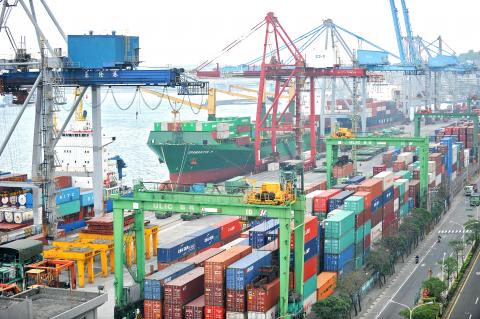Taiwan’s exports rose 21.8 percent from a year earlier to US$24.37 billion last month on demand from China, the US and Europe ahead of Christmas and the Lunar New Year, the Ministry of Finance said yesterday.
It was the third-highest value ever, with exports to Europe increasing 27.8 percent on a yearly basis to a new record of US$2.95 billion despite lingering debt problems there, the report said.
For the first 11 months, exports increased 36.6 percent to US$250.81 billion and are set to exceed the US$272.7 billion level for the whole of this year that the Directorate-General of Budget, Accounting and Statistics (DGBAS) forecast last month, Lin Lee-jen (林麗貞), head of the ministry’s statistics department, said at a news conference.

PHOTO: AFP
“Exports this quarter will outperform the third quarter as demand for consumer electronics remains strong amid the region’s fast-growing economies,” Lin said.
Shipments of electronics gained 16.4 percent yearly to US$6.75 billion last month, while those of base metals and related products increased 25.9 percent to NT$2.27 billion, the report showed.
Imports jumped 33.8 percent year-on-year to US$23.96 billion last month with capital goods contributing US$4.4 billion, suggesting active expansions on the part of the private sector, Lin said.
The latest trade figures translated into a trade surplus of US$410 million, the lowest since the global financial crisis in 2008, due to the import of three aircraft, Lin said, dismissing links with foreign exchange rates.
The New Taiwan dollar weakened NT$0.22 against the US currency last month from October, she said.
Shipments to China including Hong Kong picked up 18.2 percent yearly to US$9.83 billion last month, while exports to the US increased 32.1 percent to US$2.96 billion, the report said.
Exports to Southeast Asian countries gained 15.8 percent to US$3.53 billion last month, while those to Japan grew 12.3 percent to US$1.57 billion, the report said.
The rosy trade data is likely to encourage the central bank to hike interest rates in its quarterly board meeting later this month to cushion inflationary pressure, said Tony Phoo (符銘財), an economist at Standard Chartered Bank Taiwan Ltd (渣打銀行).
“The central bank will likely raise the interest rate by another 12.5 basis points as Taiwan’s real interest rate was in negative territory last month,” Phoo said.
The nation’s consumer price index rose 1.53 percent last month from a year earlier, DGBAS reported on Monday, while the one-year time deposit rate is currently 1.13 percent at Bank of Taiwan (臺灣銀行).
Donna Kwok (郭浩莊), an economist on Greater China at HSBC, however, said the central bank is likely to halt the interest normalization cycle this month with the NT dollar still under appreciation pressure.
“We expect the central bank to keep its policy rate frozen,” Kwok said in a note. “With the formation of new headwinds in Europe and the negative turn in the US labor market, the outlook for Taiwanese exports is gloomier than in September.”

Nvidia Corp chief executive officer Jensen Huang (黃仁勳) on Monday introduced the company’s latest supercomputer platform, featuring six new chips made by Taiwan Semiconductor Manufacturing Co (TSMC, 台積電), saying that it is now “in full production.” “If Vera Rubin is going to be in time for this year, it must be in production by now, and so, today I can tell you that Vera Rubin is in full production,” Huang said during his keynote speech at CES in Las Vegas. The rollout of six concurrent chips for Vera Rubin — the company’s next-generation artificial intelligence (AI) computing platform — marks a strategic

Enhanced tax credits that have helped reduce the cost of health insurance for the vast majority of US Affordable Care Act enrollees expired on Jan.1, cementing higher health costs for millions of Americans at the start of the new year. Democrats forced a 43-day US government shutdown over the issue. Moderate Republicans called for a solution to save their political aspirations this year. US President Donald Trump floated a way out, only to back off after conservative backlash. In the end, no one’s efforts were enough to save the subsidies before their expiration date. A US House of Representatives vote

REVENUE PERFORMANCE: Cloud and network products, and electronic components saw strong increases, while smart consumer electronics and computing products fell Hon Hai Precision Industry Co (鴻海精密) yesterday posted 26.51 percent quarterly growth in revenue for last quarter to NT$2.6 trillion (US$82.44 billion), the strongest on record for the period and above expectations, but the company forecast a slight revenue dip this quarter due to seasonal factors. On an annual basis, revenue last quarter grew 22.07 percent, the company said. Analysts on average estimated about NT$2.4 trillion increase. Hon Hai, which assembles servers for Nvidia Corp and iPhones for Apple Inc, is expanding its capacity in the US, adding artificial intelligence (AI) server production in Wisconsin and Texas, where it operates established campuses. This

US President Donald Trump on Friday blocked US photonics firm HieFo Corp’s US$3 million acquisition of assets in New Jersey-based aerospace and defense specialist Emcore Corp, citing national security and China-related concerns. In an order released by the White House, Trump said HieFo was “controlled by a citizen of the People’s Republic of China” and that its 2024 acquisition of Emcore’s businesses led the US president to believe that it might “take action that threatens to impair the national security of the United States.” The order did not name the person or detail Trump’s concerns. “The Transaction is hereby prohibited,”